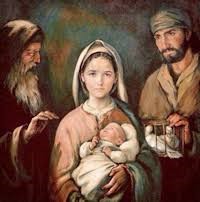In the Book of Exodus, we read about the Lord striking down “every firstborn in the land of Egypt, from the firstborn of Pharaoh sitting on his throne to the firstborn of the prisoner in the dungeon, as well as all the firstborn of the animals” (Ex. 12:29). Pharaoh then called Moses and told him to “leave my people at once, you and the Israelites! Go and serve the Lord as you said” (Ex. 12:31). As they left Egypt, God commanded Moses: “Consecrate to me every firstborn; whatever opens the womb among the Israelites, whether of human being or beast, belongs to me” (Ex. 13:2). This was one of the first laws that God commanded his newly-formed nation to follow; it even preceded the Ten Commandments. And so, from that time onward, all observant Jews would sacrifice their firstborn animals and ransom their firstborn son by offering either “a pair of turtledoves or two young pigeons” (Lv. 12:8). The Feast of the Presentation that we celebrate this weekend began to be observed in the Church in the sixth century. As its liturgy developed, the feast was celebrated devoutly, with solemn blessings and processions and with candles to honor Jesus as Simeon declared him to be “the light to enlighten the Gentiles” (Lk 2:32). Because this feast also marked the required purification of a mother after she had given birth (cf. Lv 12:1-8), it is the custom in some cultures to bless new mothers on 2 February. Since it is celebrated on Sunday only when 2 February occurs on a Sunday, it hasn’t been part of our Sunday celebration since 2014. Allow me to reflect on its significance in Salvation History and for each of us today.
This event in Jesus’ early childhood is reported only in the Gospel of St. Luke. He included this event for specific reasons. It appears that Luke wanted his readers to appreciate the fact that Jesus grew up in a family who faithfully observed the Jewish Law. As you read the account, you will notice that Luke remarked five times that the actions of Jesus’ parents were required by law. Even though Jesus would later dispute certain interpretations of the law, his position was not that of an outsider. Being nurtured carefully in Jewish Law helped prepare him to oppose the flawed and hollow practices of some who purported to be leaders of the people in the faith but used the law to their own advantage rather than for the good of the people they were charged to lead back to God.
This first appearance of Jesus in the temple also served to fulfill certain prophecies, like that of Malachi that we read in today’s first reading: “Suddenly there will come to the temple the Lord whom you seek” (Mal 3:1). Upon his appearance, our Lord would bring purification so that the sacrifices offered by the sons of Levi would be authentic and pleasing to God.
Jesus is described by the author of the Letter to the Hebrews in today’s second reading as one like us: “Since the children share in blood and flesh, Jesus likewise shared in them” (Hb 2:14). This letter also anticipates our Lord’s death which will overcome the devil and our slavery to the devil: “through death he might destroy the one who has the power of death, that is, the devil, and free those who through fear of death had been subject to slavery all their life” (Hb 2:15). In today’s Gospel, we also hear Simeon speak of the salvific nature of Jesus’ mission: “Now, Master, you may let your servant go in peace, according to your word, for my eyes have seen your salvation” (Lk 2:29). Up to this point, the gospel narrative has reflected the joy of new parents and their child, happily observing the rituals of the law they loved. But, then, Simeon interjects an ominous note: “Behold, this child is destined for the fall and rise of many in Israel, and to be a sign that will be contradicted – and you yourself a sword will pierce – so that the thoughts of many hearts may be revealed” (Lk 2:34-35). Only at great cost would Jesus carry out the purpose for which he was born. Both he and his mother would know suffering. But, that suffering, as Anna the prophetess would affirm, would bring about the redemption of Jerusalem (Luke 2:38) while offering the light of salvation to the gentiles (Luke 2:32).
Yes, this is an important feast since it demonstrates both the faithfulness of the Holy Family and offers glimpses into the great work that this little infant, presented in the temple in fulfillment of the Jewish Law, would accomplish for all of humanity. As we continue Ordinary Time, time ordered by God for our salvation, let us reflect on this feast and its meaning for us today. Whenever Jesus, Son of God and son of Mary and Joseph, came to the temple throughout his life, his presence lent purity, his words offered light and life, and, in the end, his once-and-for-all perfect sacrifice would affect the redemption of all of humankind.


